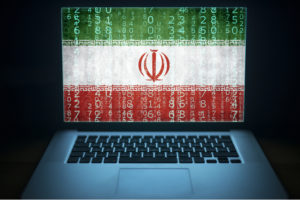Last week I explained the dangers of a cyber-war to Americans. Loss of critical infrastructure could cripple Americans’ energy, water, information and transportation systems, sending the country back into the dark ages.
Tensions in the Persian Gulf have been rising, with Iran and the U.S. locked in a disagreement over nuclear enrichment, missiles and more.
The disagreements between the U.S. and Iran have escalated into a tit-for-tat in which Iran downed a U.S. drone and has seized tankers in the Gulf, and then US Cyber Command conducted attacks against Iranian intelligence agencies.
In what may have been a response to U.S. cyber-attacks, Iran infiltrated the critical infrastructure systems of Bahrain. The Wall Street Journal reports:
Suspected Iranian hackers infiltrated critical infrastructure and government computers in the Persian Gulf nation of Bahrain within the last month, raising fears among leaders in the region that Tehran is stepping up its cyberattacks amid growing tensions.
The intrusions, according to people familiar with them, rose above the normal level of Iranian cyber activity in the region.
On Monday, hackers broke into the systems of Bahrain’s National Security Agency—the country’s main criminal investigative authority—as well as the Ministry of Interior and the first deputy prime minister’s office, according to one of the people familiar with the matter.
On July 25, Bahrain authorities identified intrusions into its Electricity and Water Authority. The hackers shut down several systems in what the authorities believed was a test run of Iran’s capability to disrupt the country, the person said. “They had command and control of some of the systems,” the person said.
Around the same time, Aluminum Bahrain—a major employer and one of the world’s biggest smelters—was also hit, the person said. After publication of this article, an executive of the firm, also known as Alba, said it was “not a recipient of a cyberattack.”
Two former U.S. officials familiar with the matter confirmed the cyber breaches in Bahrain, saying that at least three entities had suffered intrusions. One of the former officials said the breaches appeared broadly similar to two hacks in 2012 that knocked Qatar’s natural-gas firm RasGas offline and wiped data from computer hard drives belonging to Saudi Arabia’s Aramco national oil company, a devastating attack that relied on a powerful virus known as Shamoon.
Bahrain is the smallest country in the Persian Gulf, but it is strategically important because it’s the permanent home of the U.S. Navy’s Fifth Fleet and Navy Central Command. It is closely allied with its much larger neighbor, Saudi Arabia, a regional rival of Iran.
The attacks on Bahrain prompted the Department of Homeland Security to send out a warning that Iran may attempt to attack U.S. systems as well. They wrote:
WASHINGTON – In response to reports of an increase in cybersecurity threats, the Department of Homeland Security’s (DHS) Cybersecurity and Infrastructure Security Agency (CISA) Director Christopher C. Krebs issued the following statement:
“CISA is aware of a recent rise in malicious cyber activity directed at United States industries and government agencies by Iranian regime actors and proxies. We will continue to work with our intelligence community and cybersecurity partners to monitor Iranian cyber activity, share information, and take steps to keep America and our allies safe.
“Iranian regime actors and proxies are increasingly using destructive ‘wiper’ attacks, looking to do much more than just steal data and money. These efforts are often enabled through common tactics like spear phishing, password spraying, and credential stuffing. What might start as an account compromise, where you think you might just lose data, can quickly become a situation where you’ve lost your whole network.
“In times like these it’s important to make sure you’ve shored up your basic defenses, like using multi-factor authentication, and if you suspect an incident – take it seriously and act quickly. You can find other tips and best practices for staying safe online here.
“Anyone who has relevant information or suspects a compromise should immediately contact us at NCCICCUSTOMERSERVICE@hq.dhs.gov.”
Many Americans are not prepared if Iran attacks the U.S. in a “Digital Pearl Harbor.” Read my suggestions on preparing for a cyberattack on America’s critical infrastructure here.
E.J. Smith - Your Survival Guy
Latest posts by E.J. Smith - Your Survival Guy (see all)
- A Word on Stocks - July 26, 2024
- Is Vanguard Too Big? What’s Next? - July 26, 2024
- Boomer Candy? - July 26, 2024
- My BEST Insider’s Guide to Key West - July 26, 2024
- Having Fun Yet? Nasdaq Worst Day in Years - July 25, 2024















